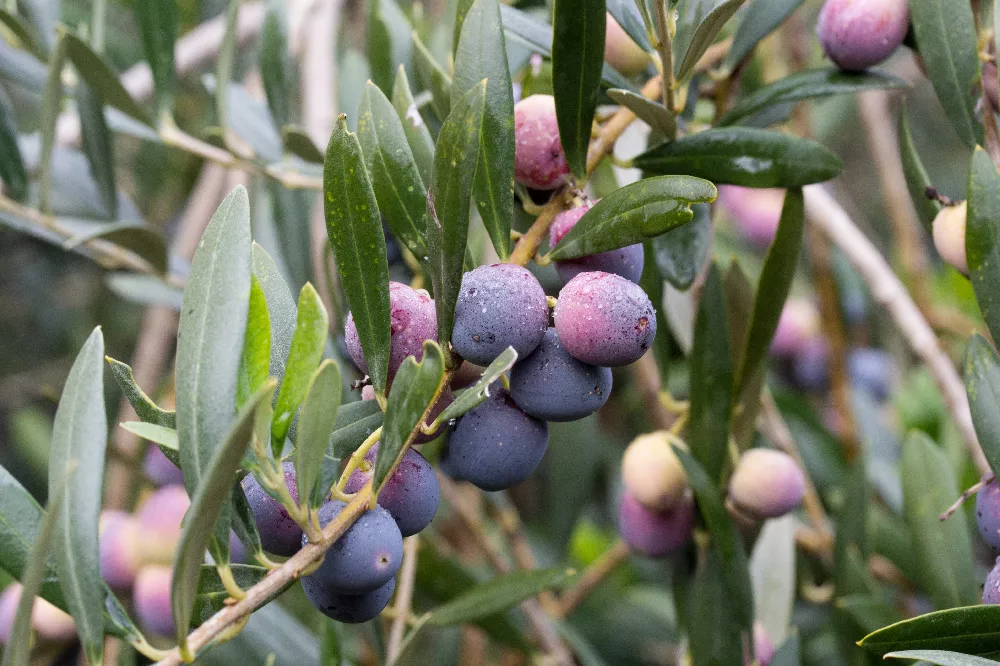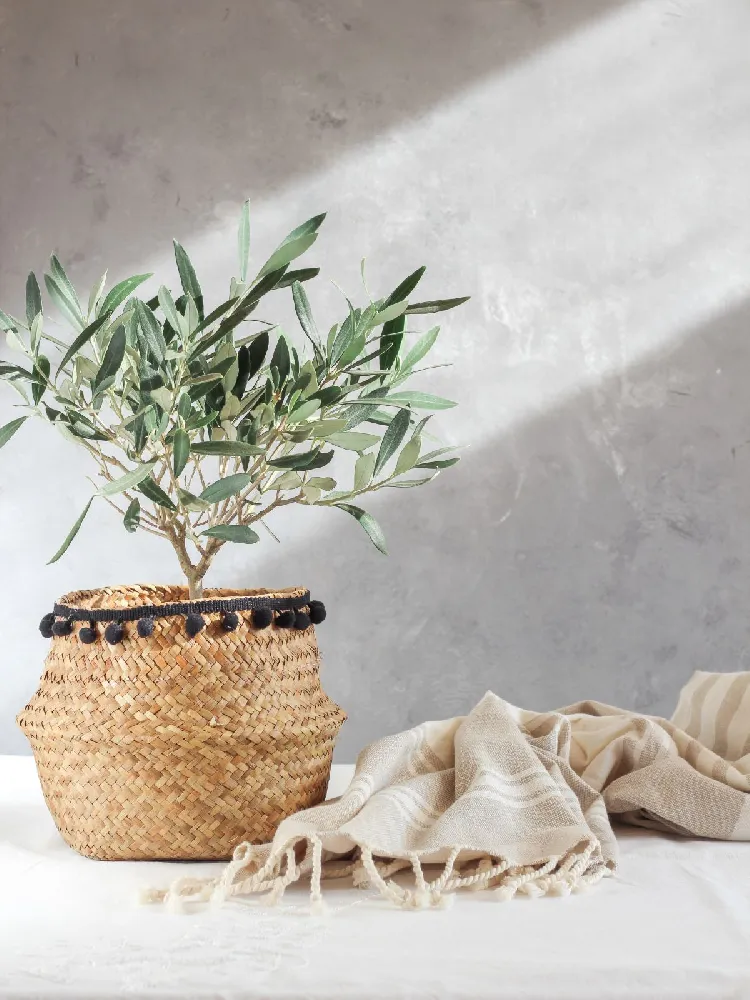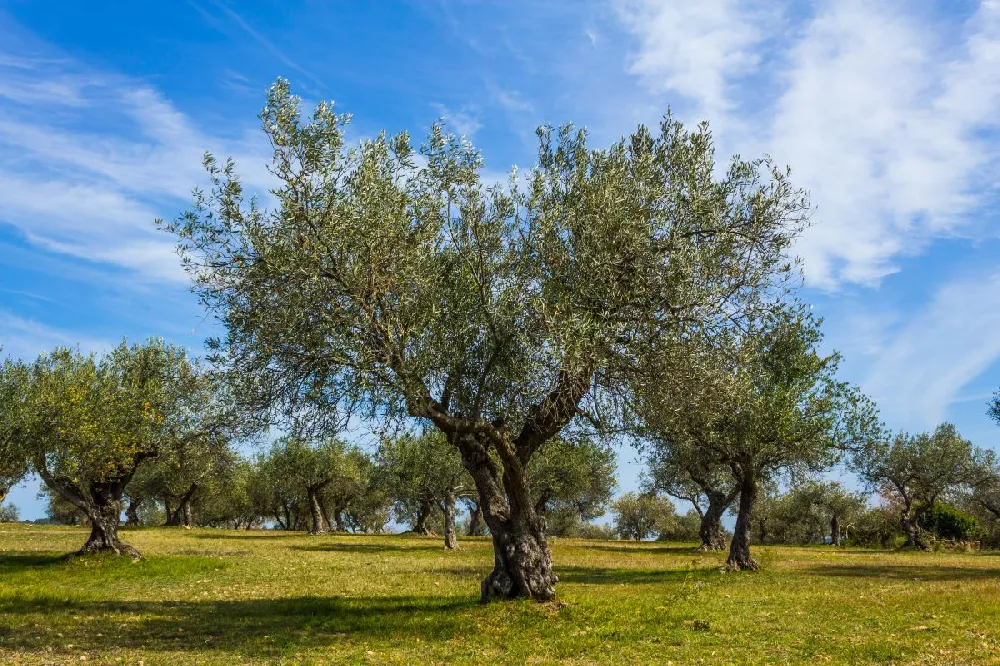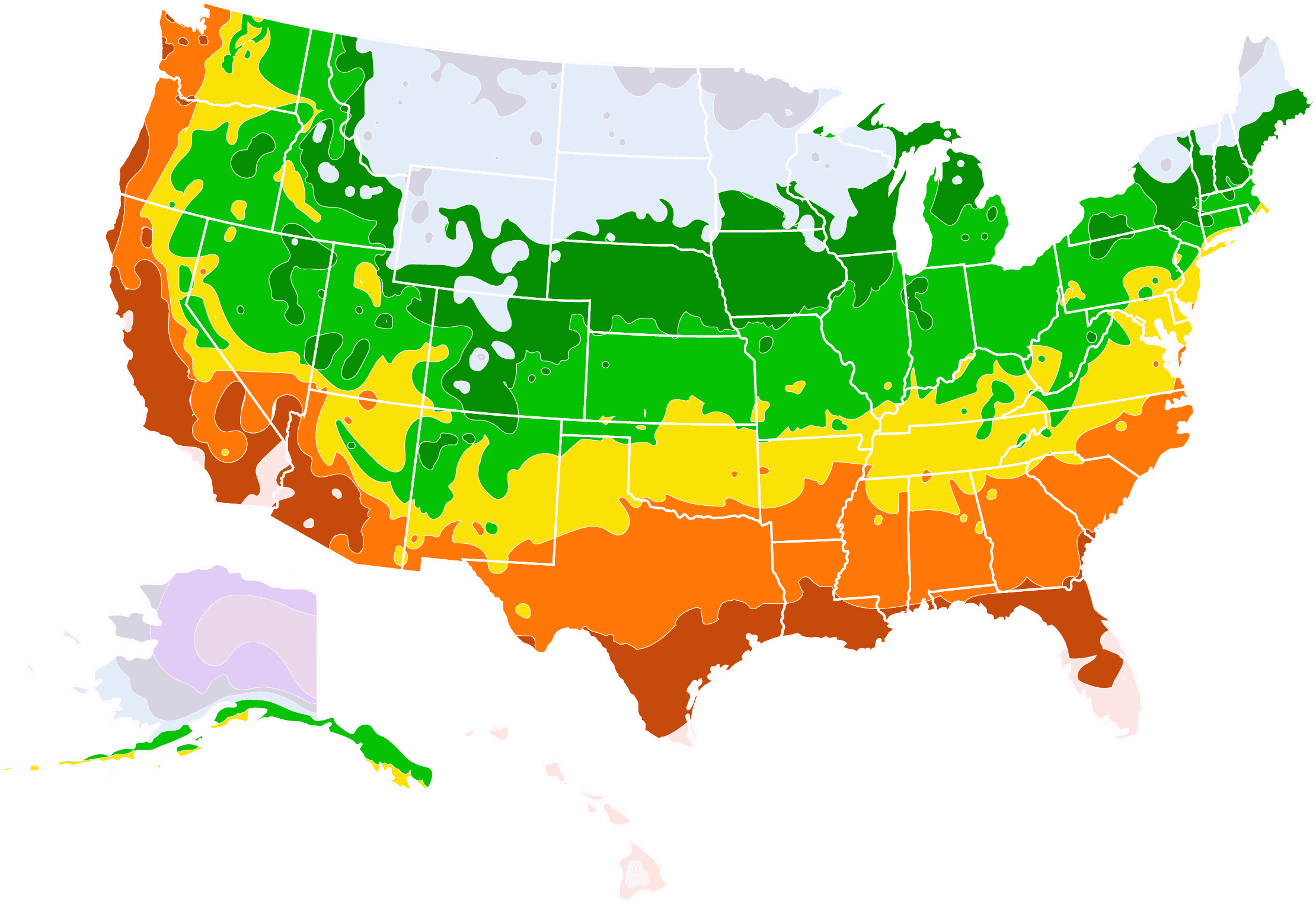- Home >
- Olive Trees >
- Arbequina Olive Trees
Arbequina Olive Trees for Sale - Buying & Growing Guide
- Ships in 1-2 days
- 1-Year Warranty Eligible
- Pots or accessories are not included unless specified in the product options.
Shipping Details:
Once your order is shipped, you’ll receive an email with a tracking number and estimated delivery date. Most orders ship immediately, but some items are seasonal and may only ship in spring or fall. These products are noted on the website.
Plant Care
Sunlight

Requires full sunlight, six hours or more per day.
Watering
Water multiple times weekly after first planting. After establishment, add water when the soil feels dry.
Fertilizing

Prefers fertilizer formulas with plenty of nitrogen. Apply fertilizer once or twice a year in spring or fall.
Planting and Care
Planting instructions
While Arbequina olive trees do best in well-draining, slightly alkaline soils, they will adapt to loamy, sandy, or clay soil. For the best production, plant or place your Arbequina olive tree in a location where it will receive at least six hours of daily direct sunlight during the growing season. If you’re planting your olive tree in the ground, the hole should be two times the width of the root ball. When planting in a container, use a well-draining pot that is twice as wide as the container in which you received your plant.
Watering and nutrients
When you first plant your Arbequina olive tree, water it regularly (approximately twice a week) to establish a healthy, deep root system. After that, you can water your olive tree once every seven to 10 days. However, be careful not to overwater your tree. Let the top one to two inches of soil dry out in between waterings to prevent oversaturation. When feeding your Arbequina olive tree use a slow-release, nitrogen-rich fertilizer with an NPK of 20-10-10, and feed it twice a year, once in the spring and once in the fall.
Pollination
Arbequina olive trees are wind-pollinated and self-fertile, which means they do not need additional plants to produce olives. However, having additional olive trees nearby will increase your olive production. If you are planning on producing a high quantity of olives, it may be worthwhile to have multiple trees, either Arbequinas, or a different olive tree variety. Arbequina olive trees typically flower from March to May. Of the roughly 500,000 flowers that an Arbequina olive tree produces, approximately one to two percent will mature into full-grown fruit.
Pruning
Arbequina olive trees need interior pruning to remove dead or diseased wood, improve light penetration, or manage the plant’s size and growth patterns. Keeping the interior of the tree canopy uncongested will allow for much-needed air flow. To encourage proper growth, you should refrain from pruning your olive tree for the first two years of the plant’s life. Once the tree is old enough, you can prune it in the spring or early summer. Pruning after the tree has flowered will allow you to assess your potential harvest and thin out branches that are not bearing fruit. Use a lopper and a pruning saw to trim your olive tree.
Pests, diseases, and animals
Arbequina olive trees are resistant to most diseases, although they may be afflicted by peacock spot, which causes spots on the tree’s leaves, and anthracnose, which affects the olives themselves. Common pests that bother olive trees include the olive lace bug, weevils, and scale insects. You can address infestations by treating leaves with insecticidal soap, or removing infected leaves and branches. Birds and foraging animals like squirrels may help themselves to your olives during the growing season. You can use a tree guard, netting, or animal repellent to keep critters away from your olive tree.
Harvesting
Harvest time for Arbequina olives is anywhere from September to December, depending on your specific climate. Arbequina olives ripen on the tree, changing colors from light green to pink to a dark, purplish-brown color. When the olives are plump and have achieved their dark color, they are ready for harvesting. Take care not to harvest too early as these olives will stop ripening after they are picked. Because Arbequina olive trees tend to be small with weeping branches, it is easy to harvest Arbequina olives by hand.
Temperature
Arbequinas don’t tolerate below freezing temperatures. To produce olives, the tree requires at least 300 hours of 45 degrees fahrenheit or higher. These trees thrive in dry, hot summers but they will also tolerate coastal climate.
Light
If growing the olive tree outdoors, it requires a minimum of 6-8 hours of sunshine a day. If grown indoors, place the potted tree in a room where it can get plenty of natural light throughout the day.
Soil
Arbequinas must be grown in a very well-drained soil. These trees don’t tolerate heavy clay soils. They prefer alkaline, sandy soil that drains easily.
Propagation
While Arbequina olive trees can be propagated from seed, it can take much longer to grow. And when the seed olive does grow, it won’t resemble the parent plant. Most olive growers prefer to grow Arbequina from branch cuttings. This can be done in summer once the tree is more than halfway through the growing season. Once the blooms have faded and the fruit starts appearing, it’s time to propagate. Follow these steps to learn how it’s done:
Step 1. Get an 8-inch nursery pot and fill it with a mix of half milled peat and half-washed sand. Saturate the sand/peat mixture with water and make a 4-inch hole with your finger in the moistened mix.
Step 2. Get an 8-inch long cutting from a healthy olive branch. It should be a quarter of an inch in diameter, ideally below a leaf node. Remove all the leaves from the base of the cutting, but leave just 5 or 6 remaining at the tip.
Step 3. Place the cutting into the moistened hole you created earlier. Make sure the sandy mix is firmly against the stem.
Step 4. Place the nursery container in a well-ventilated, lightly shaded room or outside in a sheltered area. The temperature shouldn’t exceed 70 degrees fahrenheit.
Step 5. Mist the cutting twice a day using a spray bottle. Always check the moisture level of the sand mixture when misting. Only add water to the mix when it feels dry on the top.
Step 6. Check the roots regularly to ensure they are growing optimally.
Step 7. Once the first frost has passed, repot the olive tree in a bigger container and water weekly.
How to Plant Arbequina Outdoors
Arbequina olive trees should be planted in early spring or fall. When planting outside, choose a site that receives full sun (at least 6 hours) and has good soil drainage. Arbequinas are self-pollinating so they only need one plant to yield fruit. Having said that, you can boost their yield by planting two trees – just make sure they are 10-12 feet apart from each other.
To plant your Arbequinas outdoors, remove any weeds or grass from the planting site.
Dig a hole twice as wide as the pot and the same depth. Important: don’t bury the plant deeper than it was in the container. Only a few inches of soil over the root system would be enough so as not to disturb the roots.
During the planting time, avoid adding fertilizer as this will burn the young tree. Fill the hole with soil and water it deeply.
Spread a layer of organic mulch (around 4 inches deep) over the root but avoid piling up the mulch against the trunk. Mulching prevents weed growth as well as keeps moisture in the soil.
Tip: While the newly planted tree is getting established in the first 6 months, it should be watered deeply two or three times per week. To improve fruit production, set up drip irrigation to increase root growth.
How to Plant Arbequina Indoors
If you live in a colder climate, growing Arbequinas will be more successful in order to keep your olive tree protected from the cold.
- Choose a pot that’s bigger than the nursery pot your plant came with. The pot must have large drainage holes.
- Use a well-draining potting mix with some sandy soil or gravel.
- Now position the pot in full, direct sun during the summer months and water the plant regularly whenever the top soil feels dry to the touch. You may need to water the potting medium daily. Be sure to allow the potting soil to dry out between waterings.
- The container must be placed in the sunniest spot when temperatures fall below 25 degrees fahrenheit. An east or west-facing window works best for sunlight.
- After your potted tree has outgrown its container, re-pot it and add more soil to fill the new pot. The tree can be returned outdoors once the frost passes.
- Bear in mind that potted olive trees tend to grow slower than the ones planted outside. But for those who live in colder climates with high chances of frost, growing olives indoors makes a great option.
Fun Facts

FAQs
Can you eat Arbequina olives?
Yes! This particular variety of olive is noted for having a rich, buttery flavor, and a firm, meaty texture. While the olives can be eaten alone or paired with dried figs, almonds, or a tangy cheese such as feta or chevre, they are mainly used in olive oil production, due to their high oil content. Arbequina olives produce a sweet, light olive oil with a mildly fruity scent that is useful in cooking a variety of dishes.
How big do Arbequina olive trees grow?
Full-grown Arbequina olive trees planted outdoors can reach 15 to 20 feet, with a spread of eight to 12 feet. When planted in a container and kept indoors, they can still grow as high as 10 feet, but can be kept smaller as needed with regular pruning. These trees have a moderately fast growth rate, and outdoor trees can live for many years, with proper care. Olive trees grown indoors tend to have a shorter lifespan of only about 10 years.
What temperature is ideal for Arbequina olive trees?
Arbequina olive trees are native to northeastern Spain, which has a warm, temperate climate. These trees do best outdoors in USDA hardiness zones 8-10, and indoors in zones 4-7. They are among the more cold-tolerant varieties of olive trees, able to withstand below freezing temperatures for short periods of time. If you live in zones 4-7, you can keep your olive tree outdoors for the majority of the year, but should bring it indoors during the late fall when the temperature drops below 50 degrees Fahrenheit.
Why does my Arbequina tree have yellow leaves?
There are many reasons for the yellow leaves appearing on your olive tree. If the yellow leaves are scattered throughout the tree, then this isn’t anything to worry about as Arbequinas experience continual leaf loss through the year. In fact, since these trees aren’t decidous, their leaves have a lifespan of around 2 to 3 years, after which time they turn yellow and fall off. If, on the other hand, the entire tree has yellow leaves, it could be due to lack of nitrogen. More frequent fertilizing will be necessary using a nitrogen-rich fertilizer.
How long does it take for Arbequina olive tree cuttings to root?
It takes as little as 2 to 3 weeks for your olive tree cutting to root.
Compare Similar Products
Customer Reviews
 olive tree
olive treepretty but a little sparse
 pretty tree
pretty treefairly small tree, but excited to watch it grow. gorgeous overall
 Nice but small for price
Nice but small for priceArrived good condition just small for price
 Olive Tree
Olive TreeI like it, but it's growing a little slow.
 Olive tree. 5ft-6ft
Olive tree. 5ft-6ftTree is healthy. Experience was impressive. Unfortunately a bit disappointed in the tree itself as it is a 5 ft stick with VERY LITTLE greenery or leaves at the top. But it is very healthy. In 3 years it will be gorgeous. I will order from here in the future.
 Zero problems
Zero problemsFirst time customer. Ordered two olive trees. Both in excellent condition. Packaged well. Healthy little beauties. Great job guys!
 Great Tree
Great TreeSpeedy delivery and very happy with the quality of the tree.
 Olive Tree
Olive TreeGreat experience, but hope this one lives. We had to replace before and both had died on us.
 Olives!
Olives!Beautiful minimalist yet elegant looking tree that was well packed for an out of state delivery. Highly suggest to anyone who wishes to add to their indoor plant collection.
 olive tree
olive treegreat customer service
 Looks great!
Looks great!Foliage was thinner than pictured, otherwise perfect indoor tree
 Olive Tree
Olive TreeThe tree arrived in good shape, is healthy and doing well.
 Beautiful tree!
Beautiful tree!Less "bushy" than I expected, but still very beautiful
 Olive tree
Olive treeOverall Healthy trees, lost a lot of leaves after opening, height is as described but very thin, wasn't expected to be so thin
 I love it
I love itIm a little concerned it's not getting enough sun or I am overwatering. Could you please advise of best course of care? Thank you!
 Olive tree
Olive treeI love it but when will it look like your pic and should I be shaping/trimming it?????









